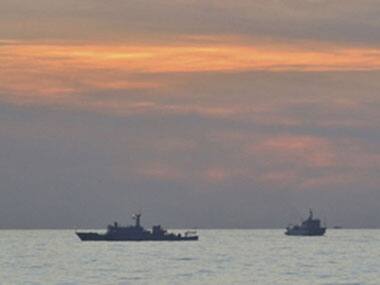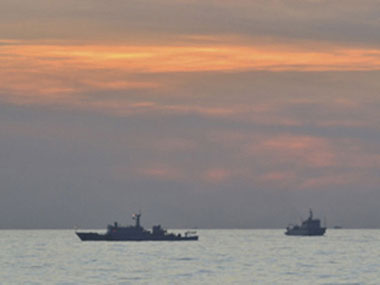New Delhi: The US on Tuesday expressed concern over China’s “provocative” and “dramatic” tactics in the South China Sea and said the American navy will shift 60 percent of its maritime assets to the Pacific by 2020. However, it underlined that the “rebalance” to the Asia and Pacific was not aimed at China but for its own economic growth. [caption id=“attachment_2133471” align=“alignleft” width=“380”]  Reuters[/caption] Referring to China’s ongoing territorial dispute with countries like Brunei, Taiwan, Malaysia, the Philippines and Vietnam over the South China Sea, a top Pentagon official said it was provocative. “And it causes tensions to be raised in the South China Sea with all the other countries in the region. I am concerned about it. I think it is an issue of concern for all of us,” Commander of the US Pacific Fleet, Admiral Harry Harris, told a group of journalists here. Harris, the highest-ranking Asian-American in the history of the US Navy and the first to attain the rank of 4-star Admiral, said it “behoves” all countries concerned about freedom of navigation to pay attention to what China was doing in the South China Sea. “It is dramatic. It is dramatic land reclamation. It is changing facts on the ground,” he said. Harris’ visit to India comes just weeks after President Barack Obama said the US was “primed to unlock” the potential of relations with India as part of its rebalance to Asia and the Pacific. He said that as part of the US rebalance, the Pacific fleet was going to get bigger. “Right now, our goal is to have 60 per cent of the US Navy assigned to the Pacific fleet by 2020,” he said, adding in a lighter vein that his area of responsibility extends from Hollywood to Bollywood and polar bears to penguins. He said the US’ submarine forces in the Pacific are at 60 per cent and surface vessel or ships at about 55 per cent. “We will get extra ships. We are sending two extra ships to Japan. We are getting four submarines into Guam. We are going to bring an aircraft carrier around. US navy presence is going to increase over the course of this decade,” he said. Asked if this rebalance was aimed at a particular country, he said it is an American strategy that is not focused on any one country. “It is not about China. It is really about us. It is about recognising that our economic future lies in the Pacific and the Indian Ocean,” he said. But even as he expressed concern about China’s tactics in the South China Sea, he was quick to describe the presence of Chinese submarines in the Indian Ocean as “positive” since they are engaged in anti-piracy operations. India has voiced concern over growing Chinese military presence in Indian Ocean. Harris, the nominee for US’ Pacific Command, said that his country has been seeing an increased Chinese submarine presence in the Indian Ocean. That itself is not a bad thing, he noted, adding that China has the right to operate in international waters and the Indian Ocean, just like India has the right to operate in the international waters in South China Sea. “I am concerned about what the Chinese are doing more in the South China Sea than the Indian Ocean because they are doing positive things out here,” he said. Asked if the US shares India’s concerns about the lack of clarity in China’s strategic intent behind its forays into the Indian Ocean, the Admiral said, “I share your concerns with China’s lack of transparency in general. Not just in waters adjacent to India but in general.” He said that one should recognise that a strong and prosperous China that recognises and follows international norms is good for everyone. “I think personally that a strong relationship between India and China is helpful just like a strong relationship between the US and China,” he said. Harris said the relationship between the US and India and the ties between the Indian and the US navies are also not about China. “The relationship between our countries also stands on its own and it is to our mutual benefit that we improve that,” he said. He stressed on the need to increase the naval exercises between the two countries and said it would be nice if there are more trilateral and multi-lateral exercises involving the US, India, Japan and Australia. Meanwhile, talking about the three “foundational” military agreements that the US wants India to sign, he said they are “important ones”. India had earlier refused to sign the three agreements, but the US has been pushing for bringing them into force. Of these, the Communications Interoperability and Security Memorandum of Agreement (CISMOA) and Basic Exchange and Cooperation Agreement for Geospatial Cooperation (BECA) enhance the capacity of military equipment already bought from the US. The third agreement, Logistics Support Agreement (LSA), would enable cashless supplies to each other’s armed forces on credit. PTI
The US on Tuesday expressed concern over China’s “provocative” and “dramatic” tactics in the South China Sea and said the American navy will shift 60 percent of its maritime assets to the Pacific by 2020.
Advertisement
End of Article
Written by FP Archives
see more


)

)
)
)
)
)
)
)
)



